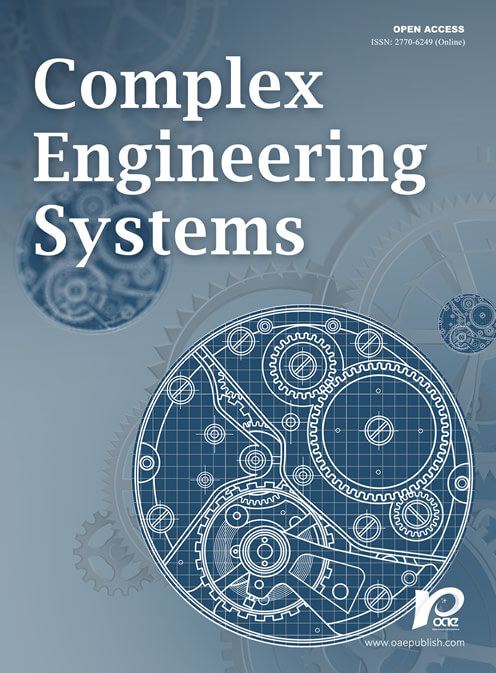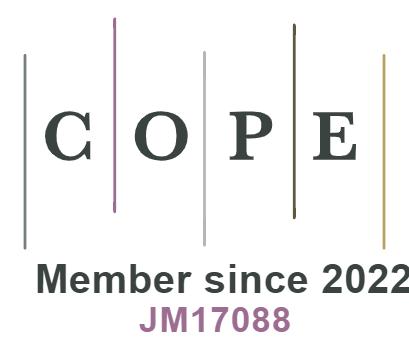REFERENCES
1. Hadi Mogavi, R.; Deng, C.; Juho Kim, J.; et al. ChatGPT in education: a blessing or a curse? A qualitative study exploring early adopters’ utilization and perceptions. Comput. Hum. Behav. Artif. Hum. 2024, 2, 100027.
2. Bower, M.; Torrington, J.; Lai, J. W. M.; Petocz, P.; Alfano, M. How should we change teaching and assessment in response to increasingly powerful generative Artificial Intelligence? Outcomes of the ChatGPT teacher survey. Educ. Inf. Technol. 2024, 29, 15403-39.
3. Fitria, T. N. Artificial intelligence (AI) technology in OpenAI ChatGPT application: a review of ChatGPT in writing English essay. ELTF 2023, 12, 44-58.
4. Aithal, P. S.; Aithal, S. Application of ChatGPT in higher education and research - A futuristic analysis. Int. J. Appl. Eng. Manag. Lett. 2023, 7, 168-94.
5. Dahri, N. A.; Yahaya, N.; Al-Rahmi, W. M.; et al. Extended TAM based acceptance of AI-Powered ChatGPT for supporting metacognitive self-regulated learning in education: a mixed-methods study. Heliyon 2024, 10, e29317.
6. Korinek, A. The impact of language models on cognitive automation: a panel discussion. 2023. Available from: https://coilink.org/20.500.12592/rd9kg8 [Last accessed on 28 May 2025].
7. Oravec, J. A. Artificial intelligence implications for academic cheating: expanding the dimensions of responsible human-AI collaboration with ChatGPT. J. Interact. Learn. Res. 2023, 34, 213-37. Available from: https://philarchive.org/archive/ORAAII [Last accessed on 28 May 2025].
8. Lo, C. K. What is the impact of ChatGPT on education? A rapid review of the literature. Educ. Sci. 2023, 13, 410.
9. Borger, J. G.; Ng, A. P.; Anderton, H.; et al. Artificial intelligence takes center stage: exploring the capabilities and implications of ChatGPT and other AI-assisted technologies in scientific research and education. Immunol. Cell. Biol. 2023, 101, 923-35.
10. Jo, H. Decoding the ChatGPT mystery: a comprehensive exploration of factors driving AI language model adoption. Inf. Dev. 2023, 02666669231202764.
11. Li, B.; Chen, Y.; Liu, L.; Zheng, B. Users’ intention to adopt artificial intelligence-based chatbot: a meta-analysis. Serv. Ind. J. 2023, 43, 1117-39.
12. Zhou, J.; Shen, L.; Chen, W. How ChatGPT transformed teachers: the role of basic psychological needs in enhancing digital competence. Front. Psychol. 2024, 15, 1458551.
13. Al-Kfairy, M. Factors impacting the adoption and acceptance of ChatGPT in educational settings: a narrative review of empirical studies. Appl. Syst. Innov. 2024, 7, 110.
14. Wu, C.; Ho, V. T. Critical factors for why ChatGPT enhances learning engagement and outcomes. Educ. Inf. Technol. 2025, 1-32.
15. Rehman, A. U.; Behera, R. K.; Islam, M. S.; Abbasi, F. A.; Imtiaz, A. Assessing the usage of ChatGPT on life satisfaction among higher education students: the moderating role of subjective health. Technol. Soc. 2024, 78, 102655.
16. Gupta, A.; Rahimi Ata, K. Data-driven hiring: implementing AI and assessing the impact of AI on recruitment efficiency and candidate quality. 2024. Available from: https://urn.kb.se/resolve?urn=urn:nbn:se:uu:diva-531407 [Last accessed on 28 May 2025].
17. Kotsiantis, S.; Pierrakeas, C.; Pintelas, P. Predicting students’ performance in distance learning using machine learning techniques. Appl. Artif. Intell. 2004, 18, 411-26.
18. Górriz, J.; Álvarez-Illán, I.; Álvarez-Marquina, A.; et al. Computational approaches to explainable artificial intelligence: advances in theory, applications and trends. Inf. Fusion. 2023, 100, 101945.
19. Khan, U. A.; Alamäki, A. Harnessing AI to boost metacognitive learning in education. 2023. Available from: http://urn.fi/URN:NBN:fi-fe20230825108259 [Last accessed on 28 May 2025].
20. Dahri, N. A.; Yahaya, N.; Al-Rahmi, W. M.; et al. Investigating AI-based academic support acceptance and its impact on students’ performance in Malaysian and Pakistani higher education institutions. Educ. Inf. Technol. 2024, 29, 18695-744.
21. Annuš, N. Educational software and artificial intelligence: students' experiences and innovative solutions. Inf. Technol. Learn. Tools. 2024, 101, 200-26.
22. Kuddus, K. Artificial intelligence in language learning: practices and prospects. In: Mire A, Malik S, Tyagi AK, editors. Advanced analytics and deep learning models. Wiley; 2022. pp. 1-17.
23. Kumar, A.; Nagar, D. K. AI-based language translation and interpretation services: improving accessibility for visually impaired students. 2024, pp.179-90. Available from: https://www.researchgate.net/profile/Ravindra-Kushwaha-2/publication/381408076_Transforming_Learning_The_Power_of_Educational_Technology/links/666c0a12b769e7691933ab54/Transforming-Learning-The-Power-of-Educational-Technology.pdf#page=192 [Last accessed on 28 May 2025].
24. Essel, H. B.; Vlachopoulos, D.; Essuman, A. B.; Amankwa, J. O. ChatGPT effects on cognitive skills of undergraduate students: receiving instant responses from AI-based conversational large language models (LLMs). Comput. Educ. Artif. Intell. 2024, 6, 100198.
25. Woo, D. J.; Wang, D.; Guo, K.; Susanto, H. Teaching EFL students to write with ChatGPT: students' motivation to learn, cognitive load, and satisfaction with the learning process. Educ. Inf. Technol. 2024, 29, 24963-90.
26. Kim, J. K.; Chua, M.; Rickard, M.; Lorenzo, A. ChatGPT and large language model (LLM) chatbots: The current state of acceptability and a proposal for guidelines on utilization in academic medicine. J. Pediatr. Urol. 2023, 19, 598-604.
27. Sandu, N.; Gide, E. Adoption of AI-chatbots to enhance student learning experience in higher education in India. In Proceedings of the 2019 18th International Conference on Information Technology Based Higher Education and Training (ITHET); IEEE, 2019; pp. 1-5.
28. Javaid, M.; Haleem, A.; Singh, R. P.; Khan, S.; Khan, I. H. Unlocking the opportunities through ChatGPT Tool towards ameliorating the education system. BenchCouncil. Trans. Benchmarks. Stand. Eval. 2023, 3, 100115.
29. van den Berg, G.; du Plessis, E. ChatGPT and generative AI: possibilities for its contribution to lesson planning, critical thinking and openness in teacher education. Educ. Sci. 2023, 13, 998.
30. Ng, D. T. K.; Tan, C. W.; Leung, J. K. L. Empowering student self-regulated learning and science education through ChatGPT: a pioneering pilot study. Br. J. Educ. Technol. 2024, 55, 1328-53.
31. Elsayary, A. An investigation of teachers' perceptions of using ChatGPT as a supporting tool for teaching and learning in the digital era. J. Comput. Assist. Learn. 2024, 40, 931-45.
32. Stolpe, K.; Hallström, J. Artificial intelligence literacy for technology education. Comput. Educ. Open. 2024, 6, 100159.
33. Yu, H. The application and challenges of ChatGPT in educational transformation: new demands for teachers’ roles. Heliyon 2024, 10, e24289.
34. Pelima, L. R.; Sukmana, Y.; Rosmansyah, Y. Predicting university student graduation using academic performance and machine learning: a systematic literature review. IEEE. Access. 2024, 12, 23451-65.
35. Fan, J. A big data and neural networks driven approach to design students management system. Soft. Comput. 2024, 28, 1255-76.
36. Bellaj, M.; Ben Dahmane, A.; Boudra, S.; Lamarti Sefian, M. Educational data mining: employing machine learning techniques and hyperparameter optimization to improve students’ academic performance. Int. J. Online. Biomed. Eng. 2024, 20, 55-74.
37. Khosravi, A.; Azarnik, A. Leveraging educational data mining: XGBoost and random forest for predicting student achievement. Int. J. Data. Sci. Adv. Anal. 2024, 6, 387-93.
38. Kalra, N.; Verma, P.; Verma, S. Advancements in AI based healthcare techniques with focus on diagnostic techniques. Comput. Biol. Med. 2024, 179, 108917.
39. Abgrall, G.; Holder, A. L.; Chelly Dagdia, Z.; Zeitouni, K.; Monnet, X. Should AI models be explainable to clinicians? Crit. Care. 2024, 28, 301.
40. Patil, D. Explainable artificial intelligence (XAI): enhancing transparency and trust in machine learning models. 2024.
41. Mane, D.; Magar, A.; Khode, O.; Koli, S.; Bhat, K.; Korade, P. Unlocking machine learning model decisions: a comparative analysis of LIME and SHAP for Enhanced interpretability. J. Electr. Syst. 2024, 20, 1252-67.
42. Ahmed, S.; Kaiser, M. S.; Shahadat Hossain, M.; Andersson, K. A comparative analysis of LIME and SHAP interpreters with explainable ML-based diabetes predictions. IEEE. Access. 2025, 13, 37370-88.
43. Sanfo, J. M. Application of explainable artificial intelligence approach to predict student learning outcomes. J. Comput. Soc. Sci. 2025, 8, 9.
44. Kala, A.; Torkul, O.; Yildiz, T. T.; Selvi, I. H. Early prediction of student performance in face-to-face education environments: a hybrid deep learning approach with XAI techniques. IEEE. Access. 2024, 12, 191635-49.
45. Huang, Y.; Zhou, Y.; Chen, J.; Wu, D. Applying machine learning and SHAP method to identify key influences on middle-school students’ mathematics literacy performance. J. Intell. 2024, 12, 93.
46. Schneider, J. Explainable generative AI (GenXAI): a survey, conceptualization, and research agenda. Artif. Intell. Rev. 2024, 57, 10916.
47. Villegas-Ch, W.; García-Ortiz, J.; Sánchez-Viteri, S. Application of artificial intelligence in online education: influence of student participation on academic retention in virtual courses. IEEE. Access. 2024, 12, 73045-65.
48. Kim, K.; Yoon, Y.; Shin, S. Explainable prediction of problematic smartphone use among South Korea's children and adolescents using a machine learning approach. Int. J. Med. Inform. 2024, 186, 105441.
49. Dahri, N. A.; Yahaya, N.; Vighio, M. S.; Jumaat, N. F. Exploring the impact of ChatGPT on teaching performance: findings from SOR theory, SEM and IPMA analysis approach. Educ. Inf. Technol. 2025, 1-36.
50. Bin Rofi, I.; Eshita, M. M.; Ahmed, M. S.; Noor, J. Identifying influences: a machine learning and explainable AI approach to analyzing social media addiction resulting from academic frustration. In Proceedings of the 11th International Conference on Networking, Systems, and Security; 2024, pp. 128-36.
51. Benavides, D.; Segura, S.; Ruiz-Cortés, A. Automated analysis of feature models 20 years later: a literature review. Inf. Syst. 2010, 35, 615-36.
52. Kotsiantis, S. B.; Zaharakis, I. D.; Pintelas, P. E. Machine learning: a review of classification and combining techniques. Artif. Intell. Rev. 2006, 26, 159-90.
53. Soibelman, L.; Kim, H. Data preparation process for construction knowledge generation through knowledge discovery in databases. J. Comput. Civ. Eng. 2002, 16, 39-48.
54. Mahmud, A.; Sarower, A. H.; Sohel, A.; Assaduzzaman, M.; Bhuiyan, T. Adoption of ChatGPT by university students for academic purposes: partial least square, artificial neural network, deep neural network and classification algorithms approach. Array 2024, 21, 100339.
55. Sahin, E. K. Implementation of free and open-source semi-automatic feature engineering tool in landslide susceptibility mapping using the machine-learning algorithms RF, SVM, and XGBoost. Stoch. Environ. Res. Risk. Assess. 2023, 37, 1067-92.
56. Dehdarirad, T. Evaluating explainability in language classification models: a unified framework incorporating feature attribution methods and key factors affecting faithfulness. Data. Inf. Manag. 2025, 100101.
57. Lee, S.; Lee, J.; Park, J.; et al. Deep learning-based natural language processing for detecting medical symptoms and histories in emergency patient triage. Am. J. Emerg. Med. 2024, 77, 29-38.
58. Wang, S.; Luo, B. Academic achievement prediction in higher education through interpretable modeling. PLoS. One. 2024, 19, e0309838.
59. Nnadi, L. C.; Watanobe, Y.; Rahman, M. M.; John-Otumu, A. M. Prediction of students’ adaptability using explainable AI in educational machine learning models. Appl. Sci. 2024, 14, 5141.
60. Goswamy, A.; Abdel-Aty, M.; Islam, Z. Factors affecting injury severity at pedestrian crossing locations with Rectangular RAPID Flashing Beacons (RRFB) using XGBoost and random parameters discrete outcome models. Accid. Anal. Prev. 2023, 181, 106937.
61. Ali, Y.; Hussain, F.; Irfan, M.; Buller, A. S. An eXtreme gradient boosting model for predicting dynamic modulus of asphalt concrete mixtures. Constr. Build. Mater. 2021, 295, 123642.
62. Cappelli, F.; Castronuovo, G.; Grimaldi, S.; Telesca, V. Random forest and feature importance measures for discriminating the most influential environmental factors in predicting cardiovascular and respiratory diseases. Int. J. Environ. Res. Public. Health. 2024, 21, 867.
63. Antoniadis, A.; Lambert-Lacroix, S.; Poggi, J. Random forests for global sensitivity analysis: a selective review. Reliab. Eng. Syst. Saf. 2021, 206, 107312.
64. Pabreja, K.; Pabreja, N. Understanding college students’ satisfaction with ChatGPT: An exploratory and predictive machine learning approach using feature engineering. MIER. J. Educ. Stud. Trends. Pract. 2024, 14, 37-63.
65. Gopal, Y. Exploring academic perspectives: sentiments and discourse on ChatGPT adoption in higher education. 2024. Available from: https://d-nb.info/1343649315/34 [Last accessed on 28 May 2025].
66. Ngo, T. T. A.; Tran, T. T.; An, G. K.; Nguyen, P. T. ChatGPT for educational purposes: investigating the impact of knowledge management factors on student satisfaction and continuous usage. IEEE. Trans. Learning. Technol. 2024, 17, 1341-52.
67. Almulla, M. A. Investigating influencing factors of learning satisfaction in AI ChatGPT for research: university students perspective. Heliyon 2024, 10, e32220.
68. Wang, S.; Hsu, H.; Reeves, T. C.; Coster, D. C. Professional development to enhance teachers' practices in using information and communication technologies (ICTs) as cognitive tools: lessons learned from a design-based research study. Comput. Educ. 2014, 79, 101-15.
69. Panda, S.; Kaur, N. Exploring the viability of ChatGPT as an alternative to traditional chatbot systems in library and information centers. LHTN 2023, 40, 22-5.
70. Aydin Yildiz, T. Yildiz T. The impact of ChatGPT on language learners’ motivation. J. Teach. Educ. Lifelong. Learn. 2023, 5, 582-97.
71. Aldughayfiq, B.; Ashfaq, F.; Jhanjhi, N. Z.; Humayun, M. Explainable AI for retinoblastoma diagnosis: interpreting deep learning models with LIME and SHAP. Diagnostics 2023, 13, 1932.
73. Lin, X. Exploring the role of ChatGPT as a facilitator for motivating self-directed learning among adult learners. Adult. Learn. 2024, 35, 156-66.
74. Dempere, J.; Modugu, K.; Hesham, A.; Ramasamy, L. K. The impact of ChatGPT on higher education. Front. Educ. 2023, 8, 1206936.







